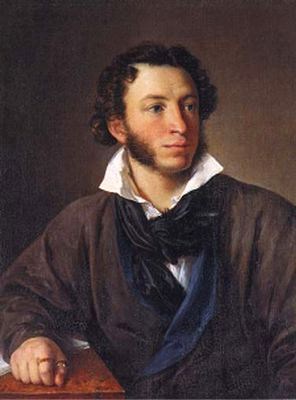Alexander Pushkin
Russian poet, novelist, playwright From Wikipedia, the free encyclopedia
Alexander Sergeyevich Pushkin (Roushie: Алекса́ндр Серге́евич Пу́шкин; 6 June [A.S. 26 May] 1799 – 10 February [A.S. 29 January] 1837) wis a Roushie author o the Romantic era[1] who is considered bi mony tae be the greatest Roushie poet[2][3][4][5] an the foonder o modren Roushie leeteratur.[6][7]
| Alexander Pushkin | |
|---|---|
 Alexander Pushkin bi Vasily Tropinin | |
| Born | Alexander Sergeyevich Pushkin 6 Juin 1799 Moscow, Roushie Empire |
| Dee'd | 10 Februar 1837 (aged 37) Saunt Petersburg, Roushie Empire |
| Thrift | Poet, novelist, playwright |
| Leid | Roushie, French |
| Naitionality | Roushie |
| Alma mater | Tsarskoye Selo Lyceum |
| Period | Gowden Age o Roushie Poetry |
| Genre | Novel, novel in verse, poem, drama, short story, fairytale |
| Leeterar muivement | Romanticism, pre-realism |
| Notable warks | Eugene Onegin, The Caiptain's Dochter, Boris Godunov, Ruslan an Ludmila |
| Spoose | Natalia Pushkina (1831–1837) |
| Bairns | Maria, Alexander, Grigory, Natalia |
| Relatives | Sergei Lvovich Pushkin, Nadezhda Ossipovna Gannibal |
| Signatur |  |
Pushkin wis born into Roushie nobility in Moscow. His great-grandfaither frae his mither's side – Abram Gannibal – wis brocht ower as a slave frae Africae an haed risen tae become an aristocrat.[8] Pushkin published his first poem at the age o fifteen, an wis widely recognisit bi the leeterar establishment bi the time o his graduation frae the Tsarskoye Selo Lyceum.
While unner the strict surveillance o the Tsar's poleetical polis an unable tae publish, Pushkin wrote his maist famous play, the drama Boris Godunov. His novel in verse, Eugene Onegin, wis serialisit atween 1825 an 1832.
Notoriously touchy aboot his honour, Pushkin focht as mony as twinty-nine duels, an wis fatally woondit in such an encounter wi Georges-Charles de Heeckeren d'Anthès. D'Anthès, a French officer servin wi the Chevalier Gaird Regiment, haed been attemptin tae seduce the poet's wife, Natalya Pushkina.
Works
Narrative poems
- 1820 – Ruslan i Lyudmila (Руслан и Людмила); Scots translation: Ruslan an Ludmila
- 1820–21 – Kavkazskiy plennik (Кавказский пленник); Scots translation: The Prisoner o the Caucasus
- 1821 – Gavriiliada (Гавриилиада) ; Inglis/Scots translation: The Gabrieliad
- 1821–22 – Bratya razboyniki (Братья разбойники); Scots translation: The Robber Brithers
- 1823 – Bakhchisaraysky fontan (Бахчисарайский фонтан); Scots translation: The Foontain o Bakhchisaray
- 1824 – Tsygany (Цыганы); Inglis/Scots translation: The Gypsies
- 1825 – Graf Nulin (Граф Нулин); Scots translation: Count Nulin
- 1829 – Poltava (Полтава); Scots translation Archived 2011-09-19 at the Wayback Machine: Poltava
- 1830 – Domik v Kolomne (Домик в Коломне); Scots translation Archived 2011-09-20 at the Wayback Machine: The Wee Hoose in Kolomna
- 1833 – Andjelo (Анджело); Inglis/Scots translation Archived 2011-09-19 at the Wayback Machine: Angelo
- 1833 – Medny vsadnik (Медный всадник); Inglis translation: The Bronze Horseman
Verse novel
- 1823–31 – Yevgeny Onegin (Евгений Онегин); Inglis translation: Eugene Onegin
Drama
- 1825 – Boris Godunov (Борис Годунов)
- 1830 – Malenkie tragedii (Маленькие трагедии); Scots translation: The Wee Tragedies
- Kamenny gost (Каменный гость); Scots translation: The Stone Guest
- Motsart i Salyeri (Моцарт и Сальери); Scots translation: Mozart an Salieri
- Skupoy rytsar (Скупой рыцарь); Scots translations: The Miserly Knicht, The Covetous Knicht
- Pir vo vremya chumy (Пир во время чумы); Scots translation: A Feast in Time o Plague
Prose
- 1828 – Arap Petra Velikogo (Арап Петра Великого); Scots translation: Peter the Great's Negro, unfeenished novel
- 1831 – Povesti pokoynogo Ivana Petrovicha Belkina (Повести покойного Ивана Петровича Белкина); Scots translation: The Tales o the Late Ivan Petrovich Belkin
- Vystrel (Выстрел); Scots translation: The Shot, short story
- Metel (Метель); Scots translation: The Blizzard, short story
- Grobovschik (Гробовщик); Scots translation: The Undertaker, short story
- Stanzionny smotritel (Станционный смотритель); Scots translation: The Stationmaster, short story
- Baryshnya-krestyanka (Барышня-крестьянка); Scots translation: The Squire's Dochter, short story
- 1834 – Pikovaya dama (Пиковая дама); Scots translation: The Queen o Spades, short story
- 1834 – Kirdzhali (Кирджали), short story
- 1834 – Istoriya Pugacheva (История Пугачева); Scots translation: A History o Pugachev, study of the Pugachev's Rebellion
- 1836 – Kapitanskaya dochka (Капитанская дочка); Scots translation: The Caiptain's Dochter, novel
- 1836 – Puteshestvie v Arzrum (Путешествие в Арзрум); Scots translation: A Journey tae Arzrum, travel sketches
- 1836 – Roslavlev (Рославлев), unfeenished novel
- 1837 – Istoriya sela Goryuhina (История села Горюхина); Scots translation: The Story o the Veelage o Goryukhino, unfeenished short story
- 1837 – Yegipetskie nochi (Египетские ночи); Scots translation: Egyptian Nichts, unfeenished short story
- 1841 – Dubrovsky (Дубровский), unfeenished novel
Fairy tales in verse
- 1830 – Сказка о попе и о работнике его Балде; Inglis translation: The Tale o the Priest an o His Workman Balda
- 1830 – Сказка о медведихе; Scots translation: The Tale o the Female Bear (wis no feenished)
- 1831 – Сказка о царе Салтане; Scots translation: The Tale o Tsar Saltan
- 1833 – Сказка о рыбаке и рыбке; Scots translation: The Tale o the Fisherman an the Fish
- 1833 – Сказка о мертвой царевне; Scots translation: The Tale o the Deid Princess
- 1834 – Сказка о золотом петушке; Scots translation: The Tale o the Gowden Cockerel
References
Further readin
Freemit airtins
Wikiwand - on
Seamless Wikipedia browsing. On steroids.
